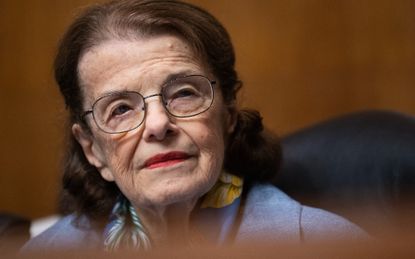Dianne Feinstein, history-making Democratic US senator, dies at 90
Her colleagues celebrate her legacy as a trailblazer who cleared the path for other women to follow


A free daily digest of the biggest news stories of the day - and the best features from our website
Thank you for signing up to TheWeek. You will receive a verification email shortly.
There was a problem. Please refresh the page and try again.
California Sen. Dianne Feinstein (D), "the trailblazing Democratic power broker" who served for 30 years, died on Thursday night, according to sources close to her, The New York Times reported. She was 90 years old.
The longest-serving woman in U.S. Senate history, Feinstein broke several glass ceilings throughout her lifetime as a political servant. However, several recent health issues have made her the target of increased scrutiny over her age and mental capacity, prompting some to call for her resignation. After a lengthy bout with shingles and complications related to the virus led to a three-month absence, Fenstein returned to Capitol Hill, using a wheelchair to get around. She eventually announced that she planned to retire at the end of her term.
“There are few women who can be called senator, chairman, mayor, wife, mom, and grandmother," her office said in a statement on X, formerly known as Twitter. "Senator Feinstein was a force of nature who made an incredible impact on our country and her home state."
Subscribe to The Week
Escape your echo chamber. Get the facts behind the news, plus analysis from multiple perspectives.

Sign up for The Week's Free Newsletters
From our morning news briefing to a weekly Good News Newsletter, get the best of The Week delivered directly to your inbox.
From our morning news briefing to a weekly Good News Newsletter, get the best of The Week delivered directly to your inbox.
An 'eloquent champion of civil rights and gun control'
A San Fransisco native and Stanford graduate, Feinstein began her political career in 1969 when she was elected to the San Francisco County Board of Supervisors, becoming its president in 1978. After two failed bids for mayor, she became the city's first woman mayor in 1978, following the double assassination of Mayor George Moscone and Supervisor Harvey Milk. She held the position for two terms until 1988. After losing a race for governor in 1990, Feinstein was elected to the Senate in 1992, becoming "California's longest-serving senator and its first woman elected to the chamber," Reuters reported. With three other women joining her in the chamber, the year she was elected was deemed the "Year of the Woman."
The senator was "an eloquent champion of civil rights and gun control who defended and also denounced national security measures in the age of terrorism," Robert McFadden wrote in The New York Times. She was a vocal advocate for gun control measures, championing the 1994 assault weapons ban former President Bill Clinton signed into law, "both a landmark bill and a continuation of a career-long effort to enact stricter gun controls," CNBC noted. As chairwoman of the Senate Intelligence Committee, another historic first, she led a review of the CIA's post-9/11 detention and interrogation program, publishing a report in 2014 that led to legislation prohibiting the methods of torture used.
Known for being a centrist, the Democrat earned a reputation as "someone eager to work across the aisle with Republicans, and at times sparked pushback and criticism from progressives," CNN reported. In a 2017 interview, Feinstein told CNN she believed "that there is a center in the political spectrum that is the best place to run something when you have a very diverse community." That reputation made her popular, "but much of that popularity eroded in the proceeding years as California’s political tint shifted toward deeper shades of blue," NBC News wrote.
The decline of a 'political giant'
Feinstein's health and age became a major focus of the latter years of her tenure as a senator. In April 2022, the San Francisco Chronicle published a report citing unnamed fellow Democrats and colleagues who expressed concern over whether she was mentally unfit to continue holding office."I remain committed to do what I said I would when I was re-elected in 2018: fight for Californians," Feinstein said in her defense.
A hospitalization for shingles in February and a three-month absence revived concerns about Feinstein's position earlier this year. Her team later reported that the virus led to complications, including encephalitis, per CNN, and she was hospitalized again in August after a fall. Speculation about her retirement "led several Democrats to announce their candidacies for her seat — even before she announced her plans," the outlet noted.
Her colleagues fondly remembered the senator after news of her death broke Friday morning. California Gov. Gavin Newsom (D) called her a “political giant, whose tenacity was matched by her grace.” per CNBC. “We lost a giant in the Senate,” Senate Majority Leader Chuck Schumer (D-N.Y.) reportedly said on the chamber floor.

Continue reading for free
We hope you're enjoying The Week's refreshingly open-minded journalism.
Subscribed to The Week? Register your account with the same email as your subscription.
Sign up to our 10 Things You Need to Know Today newsletter
A free daily digest of the biggest news stories of the day - and the best features from our website
Theara Coleman is a Staff Writer for The Week. A New York native, she previously served as a contributing writer and assistant editor for Honeysuckle Magazine, where she covered racial politics and cannabis industry news. Theara graduated from Howard University and New York University, receiving her BA and MA in English Literature, respectively. She has a background in education as a former High School English teacher. She brings her passion for reading, writing, and all things nerdy to her work as a journalist.
-
 Ben Fountain's 6 favorite books about Haiti
Ben Fountain's 6 favorite books about HaitiFeature The award-winning author recommends works by Marie Vieux-Chauvet, Katherine Dunham and more
By The Week Staff Published
-
 6 picturesque homes in apartments abroad
6 picturesque homes in apartments abroadFeature Featuring a wall of windows in Costa Rica and a luxury department store-turned-home in New Zealand
By The Week Staff Published
-
 Why 2023 has been the year of strikes and labor movements
Why 2023 has been the year of strikes and labor movementsThe Explainer From Hollywood to auto factories, workers are taking to the picket lines
By Justin Klawans Published
-
 Migrants' dangerous journey across the Darién Gap
Migrants' dangerous journey across the Darién GapThe Explainer Record numbers of U.S.-bound migrants are trekking through this remote jungle. Many don’t survive the trip.
By The Week Staff Published
-
 What to expect from the nationwide emergency alert system test
What to expect from the nationwide emergency alert system testThe Explainer The US government is testing the system's abilities with an alert to all cell phones, TVs and radio stations
By Theara Coleman Published
-
 The Indigenous referendum splitting the Australian public
The Indigenous referendum splitting the Australian publicThe Explainer The referendum would form a federal body of Aboriginal people in Australia
By Justin Klawans Published
-
 Who is Laphonza Butler, California's new senator and champion of labor?
Who is Laphonza Butler, California's new senator and champion of labor?Why Everyone's Talking About Butler has served as the president of pro-choice advocacy group EMILY's List
By Justin Klawans Published
-
 Will the cannabis banking bill get the Senate's green light?
Will the cannabis banking bill get the Senate's green light?Talking Point The SAFER Banking Act is advancing to the US Senate for the first time, clearing a major hurdle for legal cannabis businesses. Does it stand a chance?
By Theara Coleman Published
-
 Why the US needs the CROWN Act
Why the US needs the CROWN ActThe Explainer A Texas lawsuit has renewed discourse over race-based hair discrimination.
By Theara Coleman Published
-
 The ethnic conflict plaguing the Nagorno-Karabakh region
The ethnic conflict plaguing the Nagorno-Karabakh regionThe Explainer Thousands of ethnic Armenians have begun fleeing the territory out of fear of persecution
By Justin Klawans Published
-
 A Ukraine election in 2024: how it would work
A Ukraine election in 2024: how it would workThe Explainer Zelenskyy hints that country is ready for March polls but logistical, security and democratic obstacles remain
By Harriet Marsden Published










